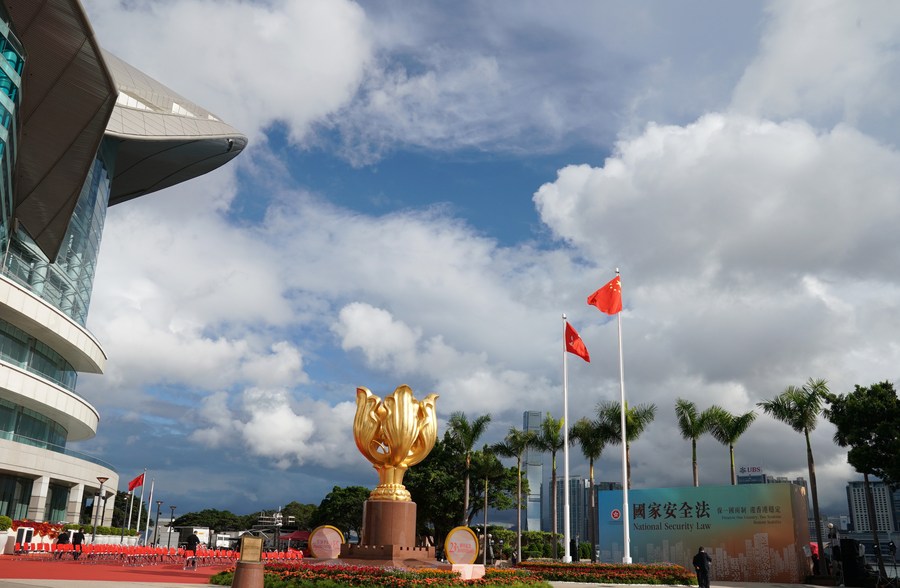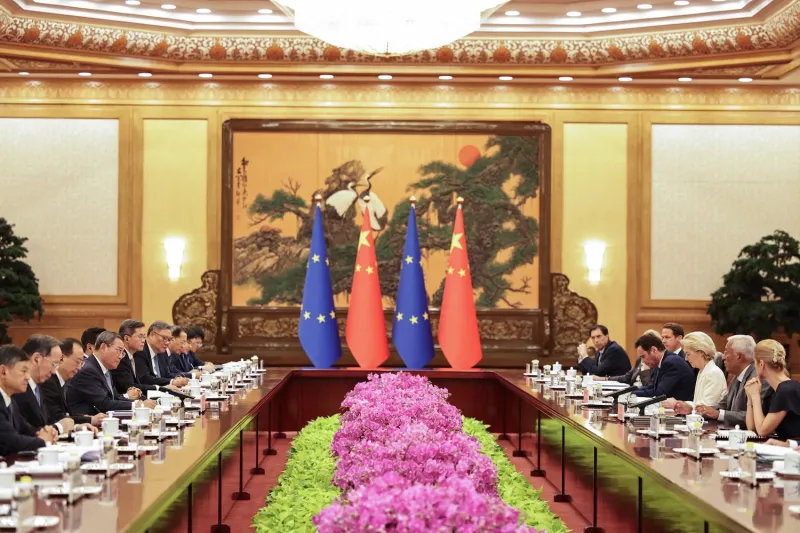Mario Cavolo: Where in HK does the US see oppression?
August 31 , 2020
Photo taken on July 1, 2020 shows the Golden Bauhinia Square after a flag-raising ceremony held by the government of the Hong Kong Special Administrative Region to celebrate the 23rd anniversary of Hong Kong’s return to the motherland in Hong Kong. [Photo/Xinhua]
By Mario Cavolo, a senior fellow at the Center for China and Globalization(CCG)
While the US administration continues to play out its McCarthyist agenda, it has no evidence to back its claim of malfeasance in the Hong Kong Special Administrative Region since the implementation of the national security law.
Where exactly is this “malfeasance”? And where exactly is the oppression of Hong Kong residents which the United States claims? Has the law prevented any resident of Hong Kong from engaging in normal activities? What is the real damage to people’s everyday life in the SAR?
The US, obviously, has no answer.
Do you feel the need to announce to the world that any human being at any time in any country has the freedom to say and do pretty much whatever they want regardless of how it may harm and disturb others? Are you planning to commit treason, secession or subversion against your state after your morning coffee?
“No”?
We are delighted to hear that. Now you are free to go about your business as you wish, as a mature, wise person, to enjoy your day in the unique city of Hong Kong as you wish. And this applies to pretty much every other city or province or region in the world that has appropriate national security laws.
And, by the way, Hong Kong no longer is a British colony where people were oppressed for more than a century. Hong Kong belongs to China, whose top legislature passed the national security law to plug the national security loopholes in the SAR and to protect its residents against the violence and looting by radicals backed by such US institutions such as the National Endowment for Democracy. These are facts, not rhetorical opinion or false accusations like those being leveled against China by the biggest and only bully in the world.
The fact also is that businesses in Hong Kong have mostly welcomed the national security law as have more than 3 million Hong Kong residents, because it is aimed at protecting the SAR’s businesses and economy, and people’s rights and properties. Many have even said the national security law should have been implemented years ago.
On July 14, the same day he signed the so-called Hong Kong Autonomy Act, the US president also issued an Executive Order for imposing sanctions on any Chinese mainland or Hong Kong officials directly or indirectly developing, adopting or implementing China’s new national security law in respect to Hong Kong, as well as the banks and other businesses that do business with those officials.
The problem is that such violations don’t exist.
There are no, and never were any, Chinese officials violating or cracking down on Hong Kong residents’ human rights, or denying them the rights to freedom of speech and peaceful assembly. Of course, it was necessary for law enforcement officers to crack down on the violent protesters and rioters who held the city to ransom for a year. Looting, vandalizing both public and private properties, attacking police officers and civilians alike, even setting an innocent man on fire are not acts we call free speech or see in peaceful assemblies. We call them crimes.
In fact, just in the few weeks since the implementation of the national security law, peace and stability are returning to all sections of Hong Kong society.
An opinion piece published in The Economist on July best explains how vested interest groups that may happen to include top international media outlets never go beyond poor research and bias before coming up with rhetoric normally found in the trashiest supermarket tabloids. The Economist said the new national security law does not have one single provision that violates any existing provisions of the Hong Kong Basic Law or the “one country, two systems “principle.
Some international media outlets intentionally twist facts and portray even seditious deeds as acts done in all innocence. For example, a media outlet reported an incident which took place after the national security law was passed thus: The first arrest under the new law, on July 1st, was of a man who was merely carrying a banner calling for an independent Hong Kong.
Such rhetoric may sound intelligent yet they spin a tale-including in cases such as the arrest of Jimmy Lai, editor and publisher of Apple Daily, a newspaper that has been spewing venom against the mainland for years.
Whipping up divisiveness while doing a poor job of trying to make it look like they aren’t is an embarrassment for Western powers. But now the lies of the US have been exposed, and, thanks to the national security law, Hong Kong residents and businesses are breathing a sigh of relief.
Topical News See more






